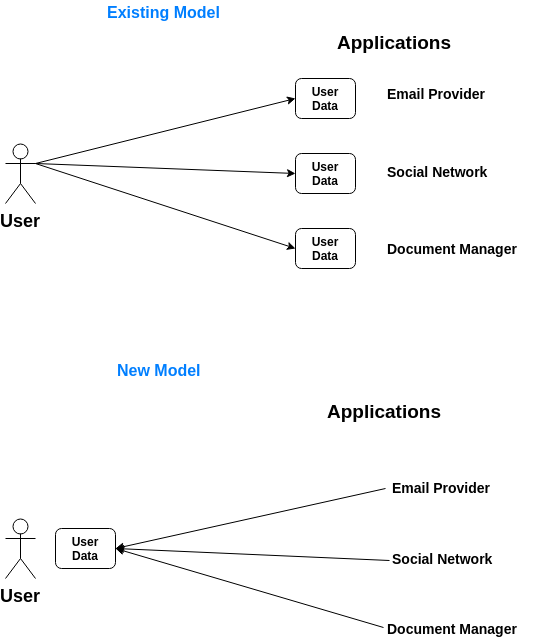Latest news about Bitcoin and all cryptocurrencies. Your daily crypto news habit.
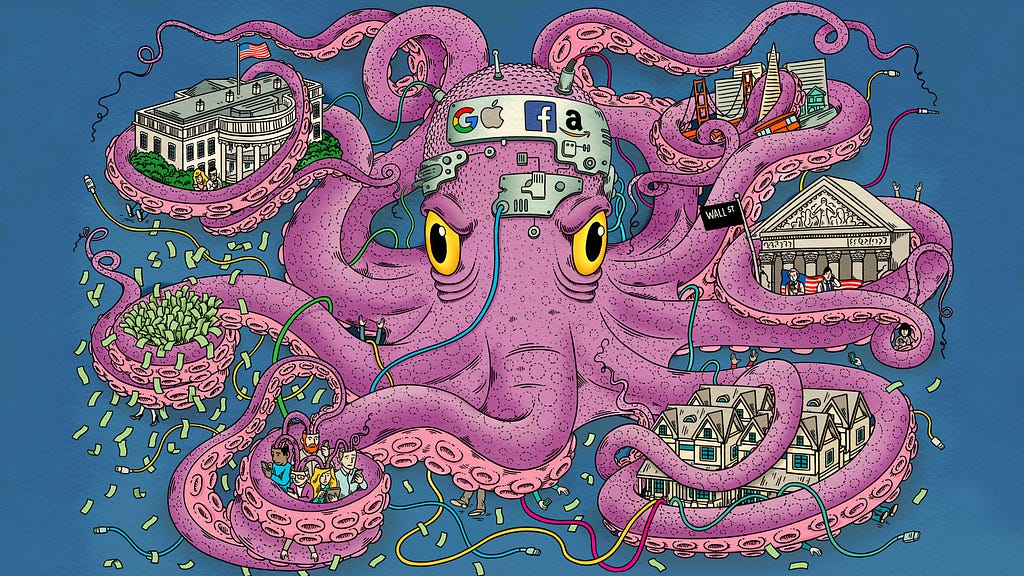 Facebook, Apple, Google, Microsoft and Amazon have a Toxic Dominance on the World
Facebook, Apple, Google, Microsoft and Amazon have a Toxic Dominance on the World
As the development at ClusterLabs progressed, so did it’s vision. It started out with a project named IpfsCloud: an open, anonymous and decentralized cloud storage platform, but today it’s an ecosystem.
Where is it today?
ClusterLabs is an open ecosystem, providing apps, infrastructure, and tools enabling decentralization.
It aims to bring the Internet 3.0, in a friction-less way to the world.
Problems today
- Censorship, privacy breach, and data monitoring are a big problem with applications.
- Users are losing control over their data.
- It is a cumbersome task for developers to build applications which solve this problem.
In short, this change(to Internet 3.0) is currently a difficult process for both, users and developers.
Solution
A new model of the Internet.
This model:
- Allows users to gain control over their data.
- Allows developers to create applications which are user- friendly(applications on this model inherently free from Censorship, privacy breach, and data monitoring issues)
- Drastically reduces cost to develop an application for developers.
- Scales with users, making the applications cheaper and efficient as more users join.
ClusterLabs brings this change(from the existing model to the new one) in a manner that is digestible and seamless(not breaking the existing Internet) for both users and developers.
Use cases
Scenario 1: How will it change experience for the user?
In the existing model, applications manage data for the users. So, users can’t inherently restrict the service providers(email provider above).
They are on the mercy of the service providers.
The new model, allows users to manage their data(explained below). This inherently allows user to have full control over their data.
The service provider merely act as an interface to organize, share(sending emails) your data using their service.
ClusterLabs helps users and developers to shift to this model.
How it helps users to manage their data?
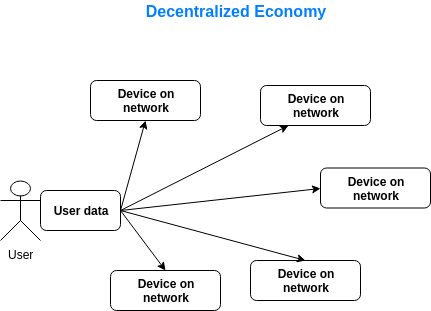 decentralized network using IPFS
decentralized network using IPFS
Users of the new model can participate in the decentralized economy. Here users can rent out their storage and computation power to other users. Eventually, this will lead to a sustainable economy which can support the network organically.
How it helps developers?
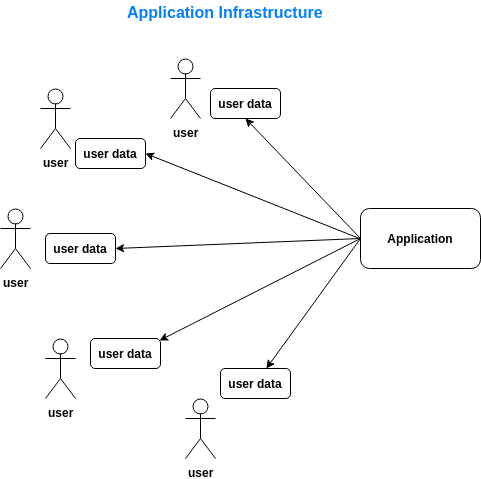 the new model drastically reduces the infrastructure costs
the new model drastically reduces the infrastructure costs
As all of the data is managed by the decentralized user network, the cost for application development and scaling the drastically reduced.
ClusterLabs provides the infrastructure, and the developer tools to the developers, so that they can focus on building applications, rather that figuring out the internal working of the decentralized platforms.
How would an ‘application’ be prevented simply copying or logging user data/sessions and use that data for its own means?
This problem is still not totally solved. But we are proposing a solution which can solve it to some extent.
The reason applications store your data(preferences/history etc.) because they want to make the user experience better. (But they also then sell the same data to wrong people). So, if the applications are able to give the same user experience without giving any data to the servers then the application creators don’t have any excuse for storing the user data.
So, if all of the data(preferences/history) is kept on the user-end, then it can be used by the application on run-time to enhance the user experience. (They can also put pre-trained models on the user-end to analyze the data and improve themselves; maybe even swarm learning using the peer-to-peer network. Notice that, here we are not sharing user data among other users when performing swarm learning. We are just communicating the improved model parameters to each-other).
Easily shift between service providers: Starting a more competitive ecosystem
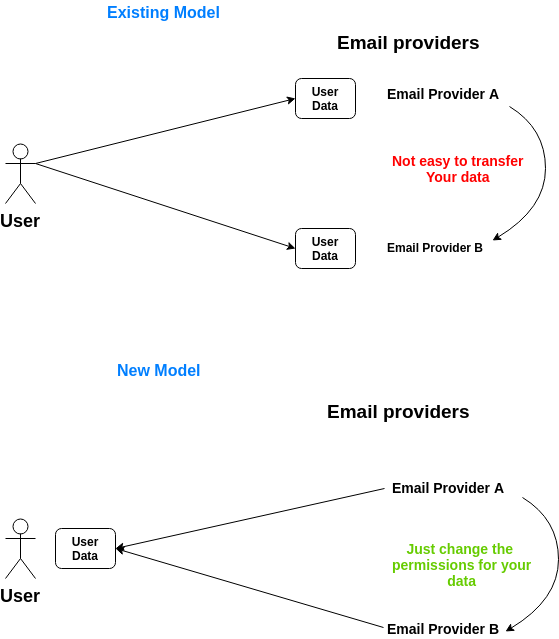 easily shift between different service providers
easily shift between different service providers
The new model gives the power to the user to shift between the service providers easily.
This starts a new ecosystem where applications can’t capture a user in its ecosystem(**cough damn Google **cough), which is one of the greatest headaches for the users today.
Milestones Achieved
1. Live working ALPHA including:
(demos: Youtube)
- IpfsCloud: Google Drive on Ipfs(Live)
- IpfsHost: Hosting Websites on Ipfs(Live)
- IpfsDocs: Google Docs on Ipfs(Live)
- SafeSearch: Search engine on Ipfs(APIs Live)
- IpfsTube: Youtube on Ipfs(Not Live)
- IpfsCollab: Sharing and simultaneous collaboration of 3d Model(Not Live)
We are providing open APIs so that it can be used for any related applications, eventually accelerating user acceptance as more apps are built on top of the platform.
- 5000 unique users in 3 weeks.
- Listed project in the official list of awesome IPFS projects(awesome-ipfs)
- 150+ pre-registrations for Android app(alpha).
What are the Challenges?
- Lack of Awareness among users: Users today, are trapped inside the comfortable and seamless ecosystem that Giants like Google, Facebook etc. have created. Users need to be made aware more about this.
- General Acceptance: Like the internet took time to become what it is today, decentralization too, has a long way to go. But today we are connected to each other more than ever. Thus, if we have a better platform, we can accelerate its acceptance.
If you are interested in being our very first users and want to check out the app before it hits the playstore then sign-up for our beta testing program here: https://goo.gl/forms/Z9g3BVZrISV1gW8M2
Follow our updates here:
- Github: https://github.com/vasa-develop/ipfscloud
- Facebook: https://www.facebook.com/ipfscloud
- Twitter:https://twitter.com/ipfscloud
- Reddit: https://www.reddit.com/r/ipfscloud
- Slack: https://ipfscloud.slack.com
- Youtube:https://www.youtube.com/channel/UCkweGFWzc4nqiyvBwZFHCww
Thanks for reading;)
About the Author
Vaibhav Saini is a Co-Founder of TowardsBlockchain, an MIT Cambridge Innovation Center incubated startup.
He works as Senior blockchain developer and has worked on several blockchain platforms including Ethereum, Quorum, EOS, Nano, Hashgraph, IOTA etc.
He is currently a sophomore at IIT Delhi.
Learned something? Press and hold the 👏 to say “thanks!” and help others find this article.
Hold down the clap button if you liked the content! It helps me gain exposure .
Want to learn more? Checkout my previous articles.
- ConsensusPedia: An Encyclopedia of 30 Consensus Algorithms
- Getting Deep Into Ethereum: How Data Is Stored In Ethereum?
- Difference between SideChains and State Channels
- ContractPedia: An Encyclopedia of 40 Smart Contract Platforms
Clap 50 times and follow me on Twitter: @vasa_develop
Say BYE to F.A.G.M.A., and HELLO to the new Internet was originally published in Hacker Noon on Medium, where people are continuing the conversation by highlighting and responding to this story.
Disclaimer
The views and opinions expressed in this article are solely those of the authors and do not reflect the views of Bitcoin Insider. Every investment and trading move involves risk - this is especially true for cryptocurrencies given their volatility. We strongly advise our readers to conduct their own research when making a decision.
